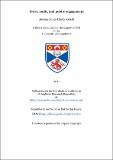Files in this item
Trust, audit, and public engagement
Item metadata
| dc.contributor.advisor | Hawley, Katherine (Katherine Jane) | |
| dc.contributor.advisor | Cruft, Rowan | |
| dc.contributor.author | Kelsall, Joshua James Clarke | |
| dc.coverage.spatial | 197 | en_US |
| dc.date.accessioned | 2024-03-13T11:51:35Z | |
| dc.date.available | 2024-03-13T11:51:35Z | |
| dc.date.issued | 2021-12-01 | |
| dc.identifier.uri | https://hdl.handle.net/10023/29478 | |
| dc.description.abstract | Public auditors such as Audit Scotland aim to provide independent assurance to the public that money is spent effectively, efficiently and that it, and the activities of public organisations, provide public value. This project has two objectives. Firstly, to develop conceptual models of public audit that support public organisations' trustworthiness as organisations that provide public value. Secondly, to develop conceptual models of public engagement that auditors (and public organisations generally) can use to build public trust in their organisations. The project has three parts. Part 1 provides the project's philosophical foundations, defining the core concepts of trust, trustworthiness, distrust, and untrustworthiness that I employ in the thesis. Then I apply those concepts to trust relations between the public and public organisations. In part 2, I examine the relationship between audit and the trustworthiness of government. I will defend audit against audit sceptics, who argue that audit undermines public organisations' trustworthiness and public trust in those organisations. I will do this by arguing that whether audit faces these objections is dependent on the model of audit practice that we adopt, and I propose models of audit that avoid the audit sceptics’ objections. In part 3, I develop conceptual models of trust- conducive public engagement, and I examine the role that auditors can play in enhancing public trust in public organisations. Firstly, I determine whether the obligation to build trust in public organisations is compatible with audit function. Secondly, I determine what public organisations' communicative obligations are; for instance, do they require public organisations always to be open, honest, and transparent? Finally, I argue that public engagement models that empower the voices of those engaged with are more likely to induce trust between the organisation which empowers and those empowered through such public engagement. | en_US |
| dc.language.iso | en | en_US |
| dc.publisher | University of St Andrews | |
| dc.subject.lcc | BJ1500.T78K4 | |
| dc.subject.lcsh | Trust | en |
| dc.subject.lcsh | Auditing--Philosophy | en |
| dc.title | Trust, audit, and public engagement | en_US |
| dc.type | Thesis | en_US |
| dc.contributor.sponsor | Scottish Graduate School for Arts and Humanities (SGSAH) | en_US |
| dc.type.qualificationlevel | Doctoral | en_US |
| dc.type.qualificationname | PhD Doctor of Philosophy | en_US |
| dc.publisher.institution | The University of St Andrews | en_US |
| dc.identifier.doi | https://doi.org/10.17630/sta/817 |
This item appears in the following Collection(s)
Items in the St Andrews Research Repository are protected by copyright, with all rights reserved, unless otherwise indicated.

